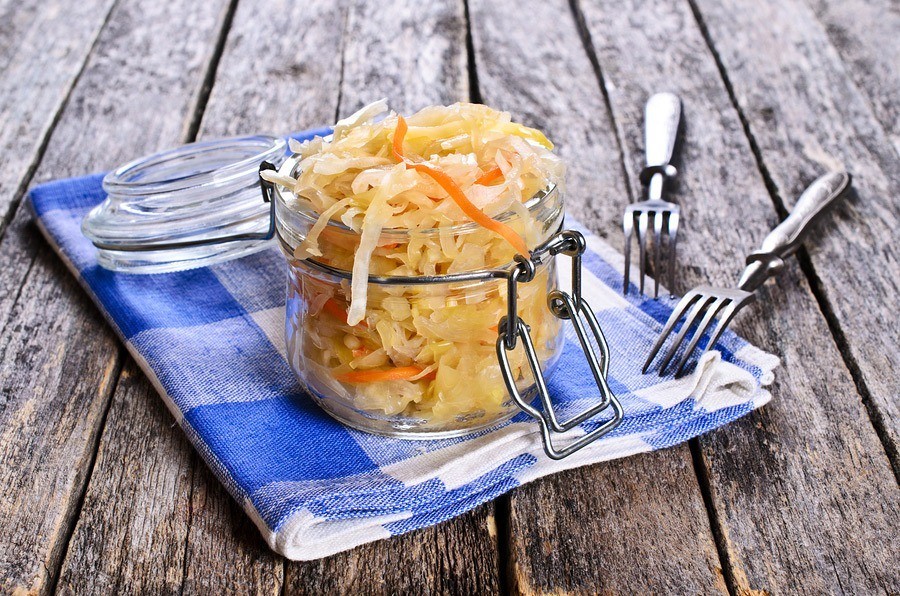Making Your Own Low Cost Probiotics
Well the science is in folks, and has been for some time! Probiotics are essential to maintaining a healthy gut, and a strong immune system. A properly functioning digestive system is the key to good health. You can grow, purchase, and eat all of the organic, mineral dense, beyond awesome food you want, but if you are not digesting and absorbing those nutrients then it is all for naught.
The same can be said for all of the fancy vitamin supplements, and even many of the probiotic supplements that are out there. There’s an old saying that goes something like: “garbage in, garbage out.” Anyway, there’s good news. You can grow your own probiotic nutritional supplements right in your homestead kitchen, or barn, or hallway closet… The point is you can be in control of your health and not have to depend on high dollar supplements grown in some lab someplace hundreds of miles away!
The Top 5 Probiotic Foods on Our Homestead
I put together a list of the top five probiotic-rich foods that we are currently or have in the past made and consumed here on the Traditional Catholic Homestead (www.traditionalcatholichomestead.com):
#1 – Kefir: We make both dairy and water kefir at home. It’s super simple, and easy to keep the process going perpetually. We usually go through about a gallon and a half of kefir per week in our household.
#2 – Kombucha: Another super simple and easily propagated probiotic beverage. The Traditional Catholic Homestead family consumes anywhere from 3 to 6 gallons of continuously brewed kombucha per week. Here’s how we brew ours: Brewing Kombucha. I really like experimenting with different herbs and teas in our brews. I’ve even heard of someone making Mountain Dew-flavored kombucha (though I wouldn’t recommend it)!
Note: Kefir grains and kombucha SCOBY will grow and reproduce so you can propagate the cultures and give away or sell the surplus.
#3 – Sauerkraut: The old homestead standby! There are a million different recipes for fermented kraut that you can make at home. As long as you don’t can the finished product it will be a probiotic-rich powerhouse. The beauty of sauerkraut is that it doesn’t require any fancy inoculants or cultures to get going. A true kraut is like a sourdough bread starter… made from wild cultures that occur all around us! Other than cabbage (or seed), no start up costs!
#4 – Other Fermented Veggies: The same process and bacteria used to make sauerkraut can be used to ferment any number of other veggies. Just use what you like or what you have in abundance. We’ve fermented carrot sticks, salsa, shredded beets with carrots, garlic… you name it. The possibilities are literally limited by your imagination and tastes!
#5 – Homebrew!!! Most people wouldn’t think of homemade beer, hard ciders, mead, or wine as a probiotic food, but if you think about it, they are. Any of your homebrews will have living yeasts present throughout the beverage (as long as you don’t pasteurize it, but who does that, right!). I know there is a big push in some circles to eliminate yeast from our diets, but they are an essential part of our digestive process. They just need to be kept in balance. Plus, homebrew is awesome!!!
Honorable mention goes to homemade vinegars. These are the living vinegars with the “mother” culture still in them. We haven’t made any yet, so I didn’t include them in this list, but homemade apple cider vinegar is coming soon to the repertoire of fermented foods on The Traditional Catholic Homestead.
Thanks to Dave Dahlsrud for participating in the [Grow] Network Writing Contest.
We’re still getting the list of prizes lined up for the Spring 2016 Writing Contest. We awarded over $2,097 in prizes for the Fall Writing Contest, including all of the following:
– A 21.5 quart pressure canner from All American, a $382 value
– A Survival Still emergency water purification still, a $288 value
– 1 free 1 year membership in the [Grow] Network Core Community, a $239 value
– A Worm Factory 360 vermicomposting system from Nature’s Footprint, a $128 value
– 2 large heirloom seed collections from Baker Creek Heirloom Seeds, valued at $103 each
– A Metro-Grower Elite sub-irrigation growing container from Nature’s Footprint, a $69 value
– 2 copies of the complete Home Grown Food Summit, valued at $67 each
– 3 free 3 month memberships in the [Grow] Network Core Community, valued at $59 each
– 4 copies of the Grow Your Own Groceries DVD video set, valued at $43 each
– A Bug Out Seed Kit from the Sustainable Seed Company, a $46 value
– 4 copies of the Alternatives To Dentists DVD video, valued at $33 each
– 4 copies of the Greenhouse of the Future DVD and eBook, valued at $31 each










COMMENTS(8)
Kimchi is easy and is a very versatile ferment that should have been included in this.
I agree! I kind of lump kimchi into the “other fermented vegetables” catagory. We love it here at our place, but you have to draw the line someplace on this sort of thing I guess. I should have made specific mention of kimchi though, thanks for the feedback!
I’ve been waiting on a conformation for a seat at the summit.
I’ve noticed several times that you don’t seem to have a problem with alcohol consumption. Any kind of alcohol consumption destroys brain cells. Such small percentages as in kombucha are harmless, but even wine that contains helpful proanthocyanidins contains harmful amounts of alcohol. Organic red grape juice has the benefits without the harmful alcohol. Naturally fermented beer and cider might be different and who knows when too much is too much, but as a general rule of healthy food consumption, we should all avoid alcohol. Roger Cole
This was super helpful! Thank you!
Interesting article, but gives little information on how to make anything. Therefore, not very useful.
I am going to make the Fout Thives tonic. Thank you so
much.